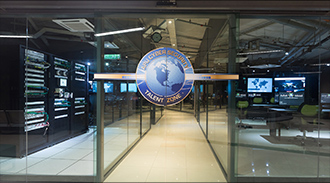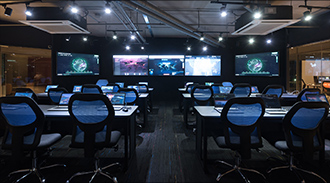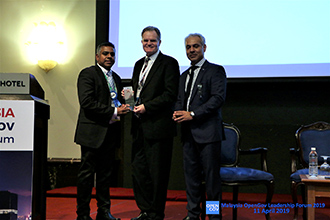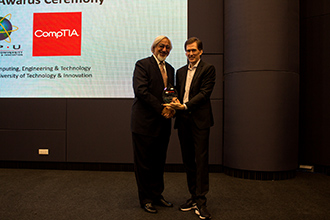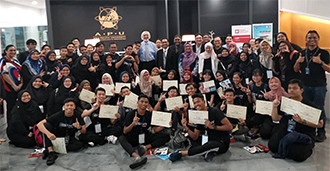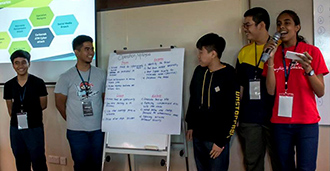You are here
Designing The IHL Cybersecurity Talent Pipeline For The National Workforce

Producing industry ready graduates is seen as being the biggest challenge for cybersecurity talent development. To the industry there is always this notion of a shortfall of skill sets and this is more evident for cyber security which is ever evolving. Taking a cue from Asia Pacific University of Technology & Innovation (APU) who have been grooming and churning out distinct Cyber Security graduates for over a decade now into the job market of which this group sits in a ratio of 1:3 on the jobs opportunity playing field. The challenges faced at APU and how they were overcome are quite amazing;
- Many jobs in the cybersecurity segment ask for 2-3yrs experience so how do fresh graduates penetrate the market. At APU students are given experiential leaning combined with exposure to real-world experiences that elevates their cybersecurity skills beyond theoretical knowledge and hones problem-solving skills. It also provides opportunities to practice blending technical and other skills such as communication, leadership, and teamwork within a security context.
Reaching out to beyond cyber security programme. Cyber security electives are offered to all the 6000+ tech students whether it’s in fields such as Computer Science, Information Technology or Software Engineering.
Depth & Breadth of curriculum content. With tech ever evolving and cyber security having the dark & white side of trades so enabling the white side professionals has been strengthened by industry skill based content as advised by our partners namely Cyber Test Systems, Cyber Intelligence, TecForte and Silensec.
Infrastructure & Ambience of Cybersecurity Professionals. This is done via courses offered where students take them seated in the facilities at APU such as our Cyber Range in which 3 courses are taught and also the Security Operations Centre (SOC) where another 2 courses are taught. The SOC is then also a mandatory manning fulfilment of 50hrs prior to graduation. The students monitor APU network traffic and do Tier 1 trouble shooting by themselves and escalate to the SOC manager for Tier 2.
| |
There needs to be a continuous interest in Cyber Security programmes. This can only be ensured by universities having implementation strategies in place. As a benchmark below here are the FIVE prong pro-active measures and actions taken at APU focused on industry relevance & marketable graduates into the workforce;
- Engaging with the industry experts. The design of APU cyber security programmes are achieved with the industry through the participation of the Industry Advisory Panel (IAP) who have cyber security expertise. The experts are integral in verifying content, direction on software/tools applications, guidance on ideas for final year projects, serve in opportunities for industrial trainings and also support via guest lectures year in year out.
Promotion of our infrastructure on all marketing mediums. In 2018 APU invested in the set up the Cybersecurity Talent Zone (CTZ) with a vision of producing nice graduates in the discipline. With the collaborative arrangements with industry partners, APU has been able to set up international standard facilities in the CTZ for teaching, learning and research. Good examples of this is the Cyber Range which is of Military Defense grade and one of 2 in Malaysia and the most equipped version in the SEA region along with the Security Operations Centre (SOC) which is one of 3 mainstream versions in IHLs within Malaysia. Both were designed, setup and commissioned with partners from the industry bridged by MDEC. A follow through on this is the professional level trainings which our students also benefit from.Malaysia OpenGov Leadership Forum APU won the prestigious Recognition of Excellence Award for its Cyber Security Talent Zone development.
Engaging with local & national agencies. APU’s Corporate Training unit furnishes industry based certification training and APU talents can professionally certify themselves while undergoing their studies and our offerings are in partnership with the likes of CSM, CompTIA, Rocheston, ISACA, EC Council.
Showcasing our talents. Competitions, research outcomes at conferences & exhibitions as an average churn out 85 publications per year in cybersecurity & forensic. APU has been annual winners at industry level competitions hosted by F-Secure, KPMG, and Australian Information Security Association (AISA). This allows for other potential students to see that the exposure is at large and you are on an industrial footing while being in university.
Showcasing the expertise. Sharing of experts’ in training or being a go to place for cybersecurity upskilling, i.e the MIA CSuite Awareness Programme. APU is also recognized as the Best Cybersecurity Education Provider in Asia – Cyber Security Excellence Awards in 2019 & 2020 and received the Award for best Cyber Security Education Provider in Asia Pacific by CompTIA in 2018.
| |
As part of Digital Malaysia developments, encouragement to IR4.0 has to start from school levels. The awareness has to be made clear on this career pathway as a standalone profession. APU has conducted school programmes in the cybersecurity area quite successfully. APU hosted the Cyber Security Immersion (CSI) for Youth programme in collaboration with MoHE and MDEC. It was a 3 Days 2 Nights programme at APU. Throughout the programme, students underwent seminars, brainstorming sessions and presentations. The contents were delivered by the academic team which covered essential technical knowledge and know-how of phishing, hacking, types of cyber-attacks and countermeasures. APU has also done Cyber Security awareness programmes at SMKs from 2018-2019 where a total of 16 schools were covered.
| |
The future in cybersecurity education is allowing the qualification as a standalone qualification as the market is so wide and jobs at a 1:3 ratio which means it’s a monstrous programme by itself. As for programme standards it should be standalone and not be parked under the cluster of Computer Science to address the depth and breadth of the content requirements mapped to workforce needs. There is a paradigm shift needed by the Malaysian Qualifying Agency (MQA) on this matter for the benefit of future graduates.
Prof Ir Ts Dr Vinesh Thiruchelvam |
Prof Ir Ts Dr Vinesh Thiruchelvam is currently the Deputy Vice Chancellor for Asia Pacific University of Technology & Innovation (APU) and the Chief Innovation Officer for the APIIT Education Group. He is also an academic advisor and external examiner to four Malaysian Public Universities. He is Professional Engineering with the Board of Engineers Malaysia (BEM) and a Chartered Engineer (CEng) with Engineering Council, UK and a Fellow of the Institution of Mechanical Engineers (IMechE-UK).
Prof Vinesh has been the Chairman of the Engineering Education Technical Division (E2TD) at the Institute of Engineers Malaysia, advisory member of the Ministry of Education’s ‘STEM Task Force’ directly involved with the development of the MoE’s Education Blueprint in 2014-2015, member of the Ministry of Human Resources’ BPIC on quality of graduates in 2014-2017, member of Malaysian National Task Force for Big Data Movements with Malaysian Digital Economy Corporation (MDeC) in 2015-2018 and is currently contributing to the Malaysian National Framework for Artificial Intelligence as a scientific expert appointed in 2019.
Prof Vinesh is also appointed on to Digital Expert Panel for Malaysia Digital Economy Corporation (MDEC) covering Cybersecurity, Data Science, Software & System Integrator, Animation, Games and Internet of Things for 2020-2024. He is also the Technical Chair and Lead worldwide for ISO under the working group TC307/WG 1 – BlockChain Fundamentals Standards Development.
Posted on July 22, 2021 by MDEC
To find out this article on MDEC blog, please click https://blog.mdec.my/?p=1225



